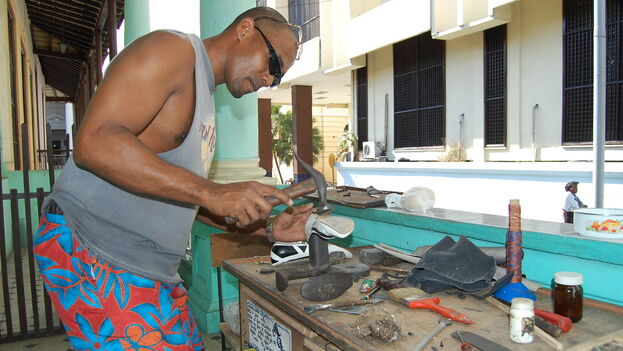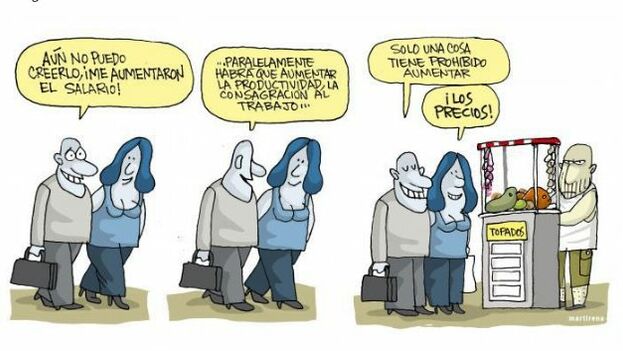
![]() 14ymedio, Yoani Sanchez, Havana, 9 August 2019 — More than 20 years ago, when I was studying Philology at the University of Havana, a colleague did a study on the headlines of the official press. The young woman compared the verbs that headlined the national news with those used for international issues. The result was that most Cuban events carried positive terms, in the style of “developing,” “building,” “expanding,” or “growing,” while articles about other countries were often titled with words such as “kill,” “destroy” and “repress.”
14ymedio, Yoani Sanchez, Havana, 9 August 2019 — More than 20 years ago, when I was studying Philology at the University of Havana, a colleague did a study on the headlines of the official press. The young woman compared the verbs that headlined the national news with those used for international issues. The result was that most Cuban events carried positive terms, in the style of “developing,” “building,” “expanding,” or “growing,” while articles about other countries were often titled with words such as “kill,” “destroy” and “repress.”
Over the years, little has changed in this editorial line which has fueled the popular belief that “for the newspaper Granma, inside the Island everything is good and everything outside, bad.” But such contrasts are expressed not only based on where the news is generated, but also when addressing the state sector as opposed to the private sector. While public companies enjoy a good part of the triumphalist phrases, self-employed people are often the targets of criticism, stereotypes and accusations.
Separated by a few days, we have before our eyes two excellent examples of this difference in treatment. The first of them was the publication, on August 5, of a text by Oni Acosta under the title Music and nightlife: vampires on the prowl? The author complained about the musical choices of a private Havana bar whose name he never mentioned, preferring to define it as “you-know-who’s place,” and accused it of having a “mediocre” repertoire and “puro reparterismo” in the song lyrics.
In addition to failing to note that much of the same music is played from the speakers of State-owned bars and recreational centers, public areas in hotels and even school parties, Acosta (or his editor) chose to title the text with two pejorative words: “nocturnality,” which is mainly used to refer to the aggravating circumstance of a crime perpetrated at night; and “vampires,” which suggests bloodsuckers or people who take advantage of the customer to suck their money to the beat of reggaeton.
Acosta’s criticism raised eyebrows precisely because he approached the phenomenon in a manner partial to and skewed towards officialdom, but also because it prolongs and feeds the prejudice against the self-employed/private sector as a promoter of bad taste while being more interested in collecting cash than in promoting good music. As an insatiable Dracula, the small Cuban business owner looks more like a greedy exploiter willing to do anything for money, than an essential pillar of the national economy, as inferred from the text.
Not even three days passed and the onslaught against individuals has risen. This Thursday, the official organ of the Communist Party published a long article signed by Luis Toledo Sande on the salary increase announced this June. As an illustration, a vignette shows two smiling state employees commenting on the benefits of the new salary with phrases that nobody anywhere, in their right mind, would say. An example: “…in parallel we will have to increase productivity, dedication to work…”

The two workers are painted in a bluish shade, dressed as officials, and walk together to a stall selling agricultural products with a sign reading “price caps.” Behind the counter, the merchant is drawn in a very different way. With greenish-yellow skin, the face of a criminal recently escaped from prison and attired in a way that tries to ridicule him and make him appear vulgar; in short, the self-employed person looks like the bad guy in the scene.
The text reinforces the attack, as it includes a tirade against economists and academics who have sounded an alert about the dangers of capping the prices of products and services. In response to them, although he mentions no names, the author warms that “it is not accidental that they try to sow doubts and uncertainties against the current increases,” and their advice not to try to regulate the market so drastically is only a “liberal confusion,” according to Sande.
The text leaves a bitter aftertaste because it gives the impression that everyone who is against the imposition of capped prices for private transport, drinks in private cafes and agricultural markets is, at least, an enemy of the homeland. This thesis, together with the Manichean cartoon vignette that heads the article, is a calculated and visceral attack on entrepreneurship.
“We are not going to go back or stop, nor allow stigmas and prejudices towards the non-state sector,” Raúl Castro said two years ago insisting on an idea he had already outlined previously. But it is not enough to say it from time to time to demonstrate a good attitude towards the private sector. The facts, the treatment that is given to the self-employed people in the press and even the way in which they are shown graphically reveal more than the slogans.
If we let ourselves be carried away by what the Cuban newspapers publish, it could be concluded that the government continues to look on private businesses with animosity. For the authorities, they are an evil, although a necessary evil.
________________
The 14ymedio team is committed to serious journalism that reflects the reality of deep Cuba. Thank you for joining us on this long road. We invite you to continue supporting us, but this time by becoming a member of 14ymedio. Together we can continue to transform journalism in Cuba.
